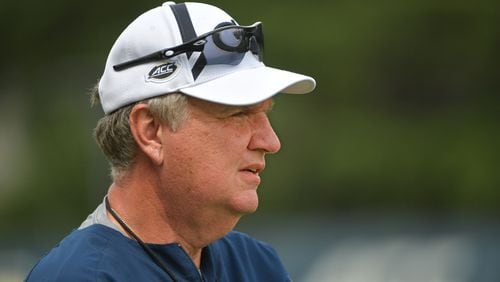As Georgia Tech begins spring practice Monday, coach Paul Johnson can easily access the frustrations of the 2017 season. The Yellow Jackets lost three games in which it held a double-digit lead in the second half (Tennessee, Miami and Virginia) and a fourth in which it held a double-digit lead in the first half (Duke).
Not being able to make up the canceled game against Central Florida, Tech finished 5-6 to miss bowl eligibility for the second time in three years. It was Johnson’s third season without a postseason game in 21 years as a head coach.
“Nobody likes losing, and I particularly hate it, but it was frustrating on a bunch of levels,” Johnson said. “It was frustrating we didn’t get to play 12 games because in my mind, if we get to play another game (and win it) and then we’re in a bowl game and you’re probably playing a non-power 5 team, and you finish the year 7-6, which would be about 70 percent of them if you go back and look.”
Which is to say, since Bobby Dodd’s retirement after the 1966 season, there have been 37 Tech teams in 51 seasons that won seven games or fewer, though the expansion of the regular season and proliferation of bowl games has made seven wins easier than in the past. (Though, on the other hand, the increased competitiveness of the ACC is a counterbalance.) Regardless, the season was frustrating.
“And then just the way we lost some of the games was frustrating,” he said. “A couple of them, I think, were fluke, and if you change just two of them, now you’re 7-4.”
The challenges at Tech are many, and Johnson doesn’t mind pointing them out. But Johnson, 76-54 (.585) at Tech, is eager to rectify matters. He will also note that he won plenty at Georgia Southern (62-10, .861) and Navy (45-29, .608).
“I don’t think anybody would say Navy’s an easy place to coach,” he said. “And the frustrating thing is, I haven’t forgotten how to coach. I don’t want to be put in a situation where I go out there and I don’t have a chance to compete. That’s when I’ll go. Because I hate losing. And I think (athletic director) Todd (Stansbury) gets that, and he sees it, and he wants to fix it.”
The fixes have been steady. The football lobby was renovated last summer, a $500,000 project. The locker room is also receiving a $4.5 million makeover, a project Johnson had long sought. Thanks to a fundraising challenge that drew about 320 donors, the team has added four recruiting staff positions.
“You never have what you want, but I think we’re getting closer to it,” Johnson said. “It’s a unique situation because we don’t have the budgets that those schools do. We just don’t have the revenue and whatever. It’s different.”
Johnson particularly pointed to Clemson and Georgia, two of Tech’s annual rivals. According to a USA Today report, Georgia’s athletic department earned $124.7 million in revenues in 2015-16, clearing $9.1 million. Clemson’s revenues were $104.8 million with about $1.7 million in profit. Tech’s revenues were $76.4 million with a profit of about $100,000. While Clemson and Georgia’s athletic departments support more sports than does Tech, the gap is not immaterial.
Last season, for example, also according to a USA Today report, Clemson allotted $14.2 million for salaries for coach Dabo Swinney and his staff, and Georgia paid coach Kirby Smart and his staff $8.4 million, with big raises coming for 2018. Johnson and his staff earned $5.9 million. Also last year, fresh off its national championship, Clemson opened its $55 million football complex.
“It’s always been tough to recruit with Georgia,” Johnson said. “Now, we used to beat Clemson when I first got here on recruits left and right. Not so much the last couple of years, but when I first got here, it was left and right. Now, it’s the same guy – Dabo was there – but they didn’t have the facilities, and the success they’ve had, and the money and this and that and the other, and I’m sure that has something to do with it. But still, it’s different.”
Given that Tech is coming off a 5-6 season and is, indeed, recruiting at a different level than Clemson and Georgia, the idea of legitimately competing with the Tigers, Bulldogs and others might sound far-fetched to many. Johnson’s message about the various ways in which Tech is behind doesn’t necessarily inspire, either.
Still, Johnson said he would like to get into the College Football Playoff before his career is over, and as he said, if he didn’t think Tech could compete, he wouldn’t be there. Tech does own wins over Georgia in its past two visits to Athens.
“I think we’ve been close,” he said. “There’s been a couple years we were close. One year, we finished seventh. I think now, if you can win the league, you’d have a good chance.”
The one year was 2014, when the Jackets finished 11-3 and seventh in the final coaches poll. It’s not a stretch to say that if Tech had beaten either North Carolina or Duke – both one-possession losses – and then beaten Florida State in the ACC title game – a 37-35 defeat in which the Jackets were without All-ACC wide receiver DeAndre Smelter – the Jackets would have been in position to earn a CFP slot.
And so Tech goes into spring practice, looking to new defensive coordinator Nate Woody to create a more aggressive scheme and an offense to build on a 2017 performance that was impressive at times but spotty overall, in his words. Johnson is hopeful that the return of 10 offensive players who started at least six games will translate to improvement in the coming season.
“So I think this spring’s going to be big for the defense, how fast they can go and trying to get people in the right spots and those kind of things, and then on offense, trying to build some depth,” he said.
Though the gap may be vast, “it doesn’t mean we can’t beat ’em,” Johnson said.
About the Author







